|
Prescription for Health Toolkit
The tools below were developed by the practice based research
networks (PBRNs) and other collaborators funded in Round 1 and
2 of Prescription for Health.
For specific questions about the components, development, or
use of these tools, please refer to the appropriate contact person.
Virginia Ambulatory Care Outcomes Research Network (ACORN)
Contact: Steven H. Woolf, MD, MPH
swoolf@vcu.edu
My Healthy Living Website: www.myhealthyliving.net
This website is a tool to help primary care doctors assist
their patients live healthier lives. On it you will find information and
guidance about diet, physical activity, smoking, and alcohol use. The material
includes some of the best information available from major national
organizations and government agencies.

Virginia Ambulatory Care Outcomes Research Network (ACORN)
Contact: Alex Krist MD MPH
ahkrist@vcu.edu
eLinkS Application to Promote Collaboration
Between Clinicians and Community Resources
The eLinkS application (Electronic Linkage
System) is designed to be a fast, easy, and practice-friendly
means to automate referrals from clinicians to community resources
and to facilitate communication using an electronic medical record
(EMR). The system is designed with the belief that clinicians
are very good at identifying unhealthy behaviors, counseling patients
on improving them, and seeking agreement on next steps. While
clinicians often lack the infrastructure, support, and expertise
to provide the longitudinal intensive counseling required to help
patients improve unhealthy behaviors, community resources are
available. Clinicians frequently report that they do not know
about these resources and do not know how to refer patients to
them. Community counseling centers report difficulties and expenses
with recruiting participants and frequently lack coordination
with ongoing clinical care. eLinkS seeks to establish this clinician-community
linkage, automate referrals, reduce staff time, and facilitate
proactive counseling.
Step 1. Clinician prompt
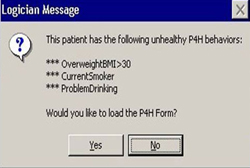
Step 2. Clinician form
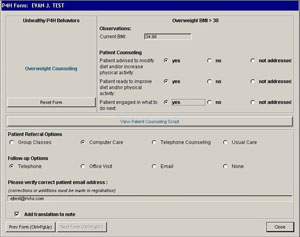
Step 3. Patient referral
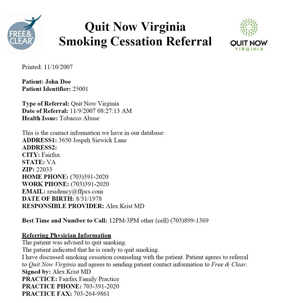
Step 4. Counselors contact patient
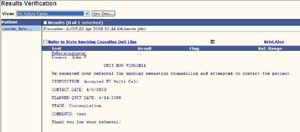
Alabama Practice Based Research Network (APBRN)
Contact: Myra Crawford, PhD
mcrawford@uab.edu
*PDA-Based Best-Practice Protocols for Tobacco and
Unhealthy Diet
These two evidence-based, best-practice protocols were
mounted on personal digital assistants (PDAs) and created to guide and prompt
physicians to assess and counsel patients on tobacco use and unhealthy diet at
the point of care. Consisting of standardized assessments, individualized
counseling, and serving as a charting aid, the protocols are easy-to-use tools
for promoting healthy behaviors that can be easily integrated into routine
daily practice and adapted to address a variety of health problems.
* Please contact Myra Crawford (mcrawford@uab.edu) to obtain a copy of
these protocols.
Colorado Research Network (CaReNet)
Contact: Wilson Pace, MD
wilson.pace@uchsc.edu

LEAP Behavior Change Booklet
The Leaders in Behavioral Change (LEAP) booklet was created
for use by practice clinicians, staff, and patients. It consists of tools to
help people set, track, and attain behavior change goals, and includes:
- recommendations for increasing physical activity including use of
a pedometer
- recommendations for cutting calories and changing eating habits
- tips for staying on track such as a goal planning calendar to
track nutrition and activity goals
- available in English and Spanish
For Download:
LEAP Booklet - English (.DOC
/ Word 548 Kb)
LEAP Booklet - Spanish (.DOC
/ Word 596 Kb)
Colorado Research Network (CaReNet)
Contact: Perry Dickinson, MD
perry.dickinson@uchsc.edu
Connection to Health Website:
www.connectiontohealth.org
This website serves to develop and assess an interactive, multiple
behavior intervention for adult primary care patients addressing
physical activity, healthy eating, cigarette smoking, and risky
drinking, that also enhances the identification and care of depression.
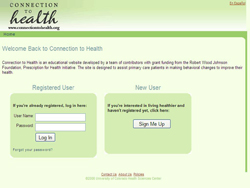
Center to Enhance Child Health Network(CECH)
Contact: Ardis Olson, MD
ardis.l.olson@dartmouth.edu
PDA-Based Health Screener and Action Plan Tools for
Teens
A self-administered health and risk assessment tool mounted
on a personal digital assistant (PDA) for completion in the exam
room prior to the health visit. The screener has 66 questions
with 2 age versions (11-14 yrs and 15-19 yrs), and it takes approximately
7 – 11 minutes to complete. It assesses nutrition, exercise,
tobacco, and alcohol use as well as other health concerns and
psychosocial risks included in the Guidelines for Adolescent Preventive
Services. The screen has branching pathways that assess readiness
to change, risk behaviors, and other problematic behaviors. Counseling
tools were also developed to facilitate patient-centered, stage-based
negotiations of a teen’s personal action plan.
For Download:
Action Plan Handout (.DOC / Word
428 Kb)
Dartmouth COOP Project (COOP)
Contact: John Wasson, MD
John.H.Wasson@Dartmouth.EDU
How’s Your Health Website: www.HowsYourHealth.org
This website was designed as clinical improvement systems
to generate health reports based on questionnaire responses, identify
problems, provide health education, disease management and stimulate
improvement. The real-time, on-line data summary displays the
needs and process of care for respondents. The summary data can
be used to compare communities, patients, and the performance
of physicians and medical care organizations. In this way the
website serves the needs of the patient, the "front line,"
and the "back office." HowsYourHealth has five major
components:
- patient/community
self-assessment of health care and needs
- education tailored to the
respondents needs
- feedback to physicians
- on-line options for retrieving
aggregate information
- options for disease
management, customizing questions, e-mail of information from patient's
computer to a doctor's office, exporting patient information to a registry
- available in English and
Spanish

Great Lakes Research Into Practice Network (GRIN)
Contact: Jodi Holtrop, PhD
jodi.holtrop@ht.msu.edu
Survey Instruments to Assess Systematic use of 5As in
Practice
These instruments were developed as part of a project to
test a consultation model of support on the delivery of preventive services in
primary care practices. The consultation model encourages
practices to increase their delivery of the 5As counseling sequence (ask,
advise, assess, assist and arrange) for tobacco use, physical activity, diet,
and risky drinking during appropriate medical visits. Trained nurse consultants
used pre and post chart audit instruments and a structured abstraction form to
assess the rates of documentation of delivery of the 5As.
For Download:
Pre Practice Assessment Instrument (.DOC / Word 72 Kb)
Post Practice Assessment Instrument (.DOC / Word 76 Kb)
Chart Audit Form (.DOC / Word 44 Kb)
Midwest Nursing Consortium Research Network (MNCCRN)
Contact: Laura Anderko, RN, PhD
landerko@uwm.edu
*The Wellness Club Instructor Manual
An instructor manual was developed for the “Wellness Club”
curriculum. This curriculum is tailored for low-income, culturally diverse
clients at risk for poor health due to poor diet and limited physical activity.
The curriculum is designed for group teaching and includes eight lessons:
- Class1: Introduction and self-assessment for health improvement
- Class 2: Healthier eating and physical activity
- Class 3: Benefits of physical activity
- Class 4: Team building for a healthier you
- Class 5: Hypertension – How to lower your numbers and chance of
stroke
- Class 6: Fiber up and cholesterol down
- Class 7: Giving it up
- Class 8: Celebration/ Recognition!: Future direction for a new
lifestyle
* Please contact Laura Anderko (landerko@uwm.edu) or Claudia Bartz (cbartz@uwm.edu) to obtain a copy of this
manual
North Carolina Family Medicine Research Network (NCFMRN)
Contact: Katrina Donahue, MD, MPH
kdonahue@med.unc.edu
Health Behavior Assessment Software
This interactive software program seeks to promote screening,
counseling, community resource use, and behavior change in primary
care practices by targeting physical inactivity, smoking, unhealthy
diet and risk drinking in adults and adolescents using Tablet
PC technology.
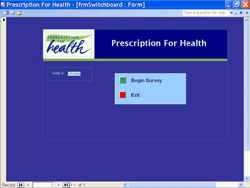
New England Clinicians Forum (NECF)
Contact: Jennifer Granger, MPH
jgranger@ctpca.org
Health & Lifestyle Screening Instrument and Workshop
for Implementing Screening and Brief Intervention Services for Smokers and
At-risk Drinkers
A 10-question screening instrument was developed to identify
smokers and at-risk drinkers. The instrument is available in English and
Spanish.
A workshop curriculum was developed for a 3.5 hour training
of primary care clinicians on the implementation of a screening and brief
counseling intervention for smokers and at-risk drinkers. The curriculum
includes materials about:
- health risks associated with
tobacco and heavy drinking
- key ingredients of effective
screening and brief counseling
- role play activities
- strategies for successful
implementation
For Download:
Health & Lifestyle Screen - English (.DOC / Word 144 Kb)
Health & Lifestyle Screen - Spanish (.DOC / Word 148 Kb)
Brief Intervention Guide - Risky
Drinking - English (.DOC / Word 120 Kb)
Brief Intervention Guide - Risky Smoking - English (.DOC / Word 76 Kb)
Feedback Report for Patients - Risky Drinking & Smoking - English
(.DOC / Word 140 Kb)
Feedback Report for Patients - Risky Drinking - Spanish (.DOC / Word 100 Kb)
Feedback Report for Patients - Risky Smoking - Spanish (.DOC / Word 64 Kb)
Curriculum for Implementing Screening and Brief Intervention
Services for Smokers and at-risk Drinkers in Primary Care Settings ( .PPT / PowerPoint 13.1 Mb)
New York City Research and Improvement Networking Group
(NYCRING)
Contact: Diane McKee, MD, MS
mckee@aecom.yu.edu
FLAIR Lifestyle Screener
The FLAIR survey (Family Lifestyle Assessment of Initial Risk)
was designed to gather information during a 2 to 4 year-old well-child
visit to screen families for risk behaviors associated with diet,
physical activity, and smoking.
For Download:
FLAIR Screener (DOC/
Word 56Kb)
Oklahoma Physicians Resource/Research
Network (OKPRN)
Contact: James W. Mold, MD, MPH
James-Mold@ouhsc.edu
Screening and Very Brief Interventions
Tools to Promote Healthy Lifestyles
The following products were designed to help primary care practices
help patients to stop smoking, adopt healthy diets and exercise,
and stop risky use of alcohol. They include screening tools for
use by the nurse or medical assistant, and assessment and brief
intervention by the clinician.
For Download:
Guide to Screening
and Very Brief Interventions (DOC/ Word 30 Kb)
Screening Items for
Behaviors (.DOC/ Word 33 Kb)
Smart Patients
Guide to Healthy Living (.DOC/ Word 36 Kb)
Food and Activity
Log Sheet (.DOC/ Word 60 Kb)
Pediatric Pittsburgh Network (PitNet)
Contact: Ellen Wald, MD
Ellen.Wald@chp.edu
*Educational Handouts for Parents and Assessment
Instruments of Knowledge about Pediatric Overweight
An educational handout was developed as a guide for parents
to help kids increase healthy eating and physical activity. The 12-page handout
contains information about weight measurement including BMI, healthy foods and
making good food choices, portion size, recommendations for physical activity,
tips for adopting a healthy lifestyle, meal plans, and online resources. The
Habit Book contains goal setting materials, food and activity logs.
Three instruments were developed to assess knowledge of
overweight and its treatment from providers (27 items), nurses or health
educators (40 items), and parents (16 items). An additional instrument was developed
to assess parents’ perceptions of overweight in their children and accompanying
guidelines for clinicians’ review of parent perceptions.
* Please contact Ellen Wald (Ellen.Wald@chp.edu) or Lin Ewing (EwingLJ@upmc.edu) to obtain a copy of these
educational and assessment tools
Pediatric Practice Research Group (PPRG)
Contact: Helen Binns, MD, MPH
hbinns@northwestern.edu
Online Resources on Child Nutrition and Physical
Activity for Primary Care Providers and Parents: www.childrensmrc.org/pprg/resources/
This website contains educational resources for primary care
providers that include:
- Health for a Lifetime: A
reference manual for primary care for the prevention and management of
childhood obesity
- educational handouts for
families in English and Spanish for normal weight and overweight children
from 0 months to adolescence, and for underweight children 2 years and
older
- male and female percent of
ideal body weight (%IBW) growth charts for children 0 – 20 years.
Available in black & white and in color for both metric and English
units

Prescription for Health Expenditures
Study Steering Committee
Contact: Maribel Cifuentes, RN
Maribel.cifuentes@uchsc.edu
Templates for Collecting and Calculating Expenditure
Data in Primary Care Interventions
This set of standardized tools (Figure 1, Tables 1, 2, and 3)
were created for the collection of expenditure data in primary
care practices during three phases of a behavioral change intervention
(baseline, steady state mid-point, and steady state end-point).
The user’s guide provides step-by-step instructions on the
use of these tools. The tools were developed to arrive at credible
estimates of start-up and incremental expenses incurred by practices
to implement their Prescription for Health interventions. The
tools were not developed to be used as data collection/calculations
instruments to undertake a full-fledged cost-benefit or cost-effectiveness
study.
For Download:
Data
Collection Guide (.PDF 1.38 Mb)
Baseline
Collection Tools (.XLS 47 Kb)
Steady
State (mid-point) Collection Tools (.XLS 51 Kb)
Steady
Stat (end-point) Collection Tools (.XLS 47 Kb)
Reporting
Tool (.XLS 22 Kb)
Additional
Resources (.PDF 160 Kb)
Research Association of Practices (RAP)
Contact: Susan Flocke, PhD
susan.flocke@case.edu
ARCH Website: www.arch2healthyhabits.org
This website was designed to connect patients of primary
care practices in Cleveland, OH to resources for living a healthier lifestyle
including:
- community programs in Cuyahoga
County for weight loss, exercise, diet and nutrition, and quitting smoking
- information about diet, exercise,
smoking, & your health
- guides and action plans to help
change health behaviors
- healthy behavior tips,
quizzes, and calculators
- website links where you can
talk to others trying to change health behaviors

Virginia Practice Support and Research Network (VaPSRN)
Contact: Scott Strayer, MD, MPH
SMS6U@hscmail.mcc.virginia.edu
*MLIT Software Program for Handheld Computers
The Modular Lifestyle Intervention Tool (MLIT), a novel
software program for handheld computers was designed to improve clinicians’
ability to provide patient-tailored counseling about smoking cessation at the
point of care. The MLIT’s theoretical underpinning is the Transtheoretical
Model (TTM) of health behavior change. The MLIT guides the identification of
the patient’s current “stage” and assists clinicians with stage-based smoking
cessation counseling. Each stage is linked to scripted motivational interviewing
(MI) and stage- relevant clinical content. The tool also contains local and
national resources for smoking cessation follow-up (i.e., National Cancer
Institute’s smoking quitline telephone number).
- Main Screen Subject Files
(Table of Contents)
--precontemplation
--contemplation
--preparation
--action
--maintenance
--relapse
--motivational interviewing – DARES
--stages of change tool
--local and national resources
- Smoking Category
--commonly prescribed smoking
cessation drugs
--second-line pharmacotherapy
--smoking dependency assessment
(Fagerström Questionnaire)
Main Screen
Assessment
 |
Stages of Change
Recommendations
 |
Stage-based Counseling
Main Screen
 |
Pharmacotherapy
Main Screen
 |
Smoking Cessation
Resources
 |
|
* Please contact Scott Strayer (SMS6U@hscmail.mcc.virginia.edu)
to obtain a copy of this software
|